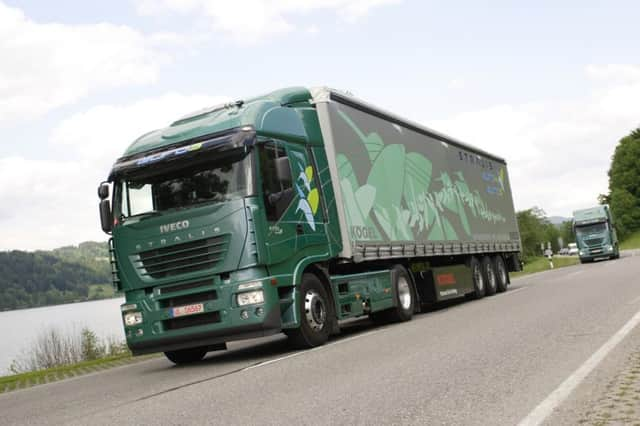Should we ban lorries from cities at rush hour?


Rush hour in any town or city can be a frustrating time of day, whether you’re on the way into work or heading home. Traffic is at its worst and even the smallest of delays can quickly escalate into gridlock. One of the most obvious culprits cited by drivers are HGVs (heavy goods vehicles) that can find it tricky to thread through narrow gaps and have to stop often to make their deliveries.
If HGVs were restricted and could only enter a pre-determined area of towns and cities, it would alleviate the problems they cause. Other drivers would have a clearer view of the road ahead and congestion would be eased.
Advertisement
Hide AdAdvertisement
Hide AdThere is also a safety element to consider. Rush hour forces together the highest concentration of traffic and often mixes the most vulnerable with the largest vehicles on our roads. By removing HGVs, pedestrians, cyclists and motorcyclists could be better protected.
That’s the thinking and it’s being considered by the Greater London Authority to make the capital a safer, freer-flowing place for traffic during rush hour. London is similar to many UK cities in that it was laid out long before cars, trucks, buses and any other form of motorised transport ever existed. As a result, the roads have to cope with vehicles that don’t always fit easily, and volumes of traffic that were never anticipated.
Removing HGVs from the rush-hour melee is an obvious route as it takes away some of the largest, slowest moving vehicles. For any driver who has sat behind an HGV for long periods on the daily commute, this will sound like manna from motoring heaven.
However, there is a flip side to taking trucks away from the road during rush hour. For starters, where are they going to park? Yes, they could remain at their depots or in lorry parks, but then that would delay deliveries to many of the shops and businesses that rely on trucks to deliver the goods they need to operate.
A solution might be for lorries to make their deliveries earlier in the day, beating the rush-hour traffic. However, most trucks make multiple drops and already start early, so this would mean drivers having to start work in the middle of the night and that carries inherent dangers of fatigue and driving in the dark.
If HGVs have to wait until after rush hour, it limits their window of operation as the afternoon rush hour puts a block on when they could work up to. If your business doesn’t receive goods because a driver has to leave the city centre before reaching you, would you be happy with that?
The Freight Transport Association (FTA) says what is needed is a shift in the driving culture in the UK. While the FTA doesn’t explain this fully, we certainly need to improve all drivers’ attitudes towards other vehicles. We also need to look at protecting the most at-risk road users more fully, providing cycle lanes for bicycles and educating cyclists more about the dangers of HGVs. If we all understood the challenges faced by users of other forms of transport, we would get along a lot better.
Banning trucks from town centres during rush hour is impractical. Asking road users to be more considerate is also a steep mountain to climb, but one that will ultimately yield longer term benefits.